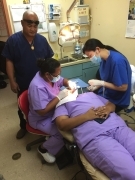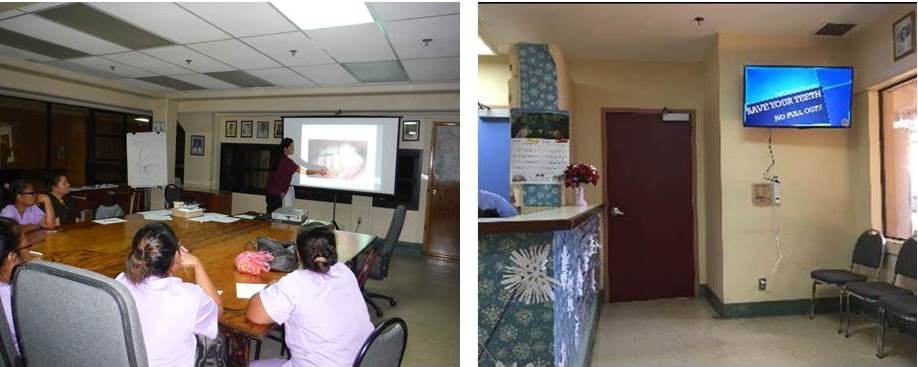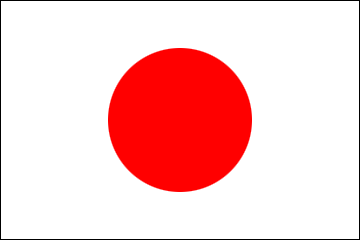JICA Volunteer: Haruko Obara
2018/3/22

JICA Volunteer
Dental Hygienist, Haruko Obara
Dental Hygienist, Haruko Obara
Belau,Kom kmal mesulang
‘ Betel nuts…What is that? ’ My activity in Palau started with this question. ‘I’ve never heard or seen it…I came to realize it was something that affected the health of people’s mouths in Palau. I have to do something to save their teeth!’ I was thinking about it in the beginning…
I arrived in Palau in 2016, January. I was surprised because there are Japanese style buildings, food (I especially liked kangkum and ukaeb) and Japan-like atmosphere here in Palau. Palauan people are very friendly, funny and they think helping each other is so important, which is very nice. My host family considers me as part of their family. They care about me and teach me Palauan customs. My Palauan life started surrounded by such warm hearted people.
My main activities at Belau national hospital are unification of dental hygienist levels, enhancing public awareness of dental health, oral health education, assisting dentists and cleaning when we are short of staff. In Japan, one has to go to hygienist school for 2 or 3 years and pass the state examination to become a dental hygienist. However, there is no dental school in Palau at the moment. All 10 local hygienists were trained locally at Belau national hospital dental clinic as dental assistants and later took hygienist training provided by the oral health department of Fiji National University.
3 months after I started my activity, I began providing 90 minutes training twice a week for 2 months. The following year, I increased the training to 3 times a week for additional month. I was able to understand the different characters and levels of each hygienist after the training. I noticed the changes after the training and gradually over the next year, I saw further improvements. For example, the way hygienists’ educated patients were more detailed, by using flip charts, poster and tooth models. I could see that their techniques had changed too. I was surprised when I found out each hygienist had their own instrument set, because many Japanese hygienists don’t have their own instrument. When I did refresher courses for the dental team, some hygienists asked me to see their patients with them for assessment and follow up, which made me very happy.
I noticed some differences in patient care between Palau and Japan. For instance, in many cases when teeth could be treated, patients immediately asked for tooth extractions to alleviate pain. Gum disease treatment takes longer if you have serious condition. Most of the patients who I have seen have gum disease and don’t really know its cause. I strongly believe that if the dental team continues to teach the public about oral hygiene, the current situation will improve. During my stay, my fellow hygienists and I encountered situations where we cannot follow up certain cares, since the visit was either school or clinic outreach visit.
We also had to tackle the “elephant in the room” – betel nut. It was intriguing to come across something so cultural, so traditional that was affecting the mouths of most of our patients. I can’t avoid talking about betel nuts, when I talk about the difficulty I faced as a dental hygienist. When I asked ‘Do you know the cause of cavity or gum disease?’ to Palauan people, everybody answered confidently, ‘Betel nuts!’. Indeed, betel nut is one of the risk factors, although it is not the direct cause. Everybody knows it’s bad, but it is hard to stop chewing. I was curious what it taste or feel like and wanted to have the same experience as people who chew, so I tried betel nut several times. It tasted bitter, smelled unique and felt dizzy…and the fiber stacked between my teeth and my mouth became red. Now I know it’s not good for teeth and health. My hope was to at least help the people of Palau and my friends to understand the effect of chewing betel nuts.
Gradually, I understood that betel nut is a part of Palauan culture as to start conversation and to bond people. It would be selfish of me to strongly persuade people to stop chewing, because I’m an outsider and at the same time, I respect Palauan culture. In my opinion, I want Palauan people to limit the number of betel nut to 1 to 3 per day (of course, I would like the chewers to totally quit them, concerning their health issues). I also found out that people need more basic dental information, so I requested equipment to JICA. A TV monitor for awareness education was installed at the waiting room. I made 12 kinds of slides so far to play on the TV and also making two more kinds of videos and slides together with the hygienists. In the near future, we plan to show different types of slides, which are about diabetes, NCD and others.
I understand the cultural implications that chewing betel nut has to Palauan people. On the other hand, changes are happening gradually and I wish I had more time to see more improvement. Although what I have done may be little, I hope I have contributed to improve the oral health status of the people of Palau.
My activity will end in one month and I would like to thank everyone who accepted me, especially my lovely host family and the dental team. I wouldn’t have made it here in Palau without the support of such a wonderful people and thank you all for helping me. I would like to do my best and contribute as much as I can for the rest of my days. I didn’t expect that I would be learning so much before I came here and I appreciate everyone that I have met in Palau. I can’t forget this experience in Palau, which was one of the best times in my life.
Ar chad er Belau a kmal bekururau e ubechubchad. Kom kmal Mesulang.

